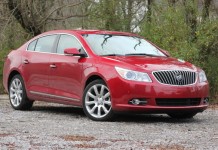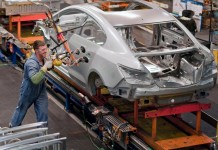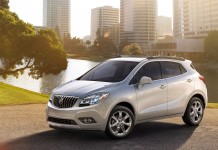Buick unveils the 2012 LaCrosse with eAssist,™ a new fuel-saving technology that increases fuel economy by 25 percent compared to the four-cylinder/six-speed powertrain in the 2011 LaCrosse. The eAssist technology provides class-leading highway fuel economy of 37 mpg, while maintaining the luxury, performance and value expected from Buick’s flagship sedan.
The eAssist system becomes the standard powertrain on LaCrosse starting next summer. The system uses a state-of-the-art lithium-ion battery system and electric motor-generator to enable regenerative braking capability to improve LaCrosse fuel economy by an estimated 25 percent.
“The LaCrosse with eAssist technology is the latest example of how this successful car – with sales up more than 200 percent for the year – is shaking up the segment and helping to reinvent Buick,” said John Schwegman, vice president of Buick marketing. “It is the smart choice for those who want great fuel economy and performance in a luxury vehicle, with excellent value – the LaCrosse with eAssist will cost thousands less than competitors with similar technologies.”
Mated to a 2.4L Ecotec direct injection four-cylinder engine and next-generation six-speed automatic transmission, the eAssist system uses power stored in the battery to provide needed electrical boost in various driving scenarios, optimizing engine and transmission operation. An advanced 115V lithium-ion battery and latest-generation 15-kW motor-generator unit help increase fuel economy through:
- Regenerative braking, which provides up to 15 kW of electricity to charge the battery
- Providing up to 11 kW (15 hp) of electric power assistance during acceleration
- Automatic engine shut-off when the vehicle is stopped
- Aggressive fuel cut-off during deceleration down to zero vehicle speed, enabled by the torque smoothing provided by the motor-generator unit
- Intelligent charge/discharge of the high-voltage battery.
Buick LaCrosse with eAssist technology also features improved underbody aerodynamics and tires optimized for performance and fuel economy, as well as active control of front-end airflow that improves aerodynamics and engine warm-up. Electronically controlled shutters in the lower grille close at higher speeds to push more air over the vehicle, which increases aerodynamic efficiency to enhance fuel economy. All of these technologies increase the eAssist system’s regenerative braking capability, while also improving the vehicle’s efficiency while driving.
“LaCrosse was the first in its segment with a four-cylinder/six-speed powertrain, the first with HiPer Strut and is now is leading the way with the new standard eAssist technology,” said Schwegman. “Importantly, LaCrosse with eAssist is the standard powertrain for four-cylinder-equipped models and there isn’t a cost premium.”
LaCrosse with eAssist includes an ECO gauge on the instrument panel that continuously responds to driving behavior, enabling the driver to drive with maximum efficiency. It also features a hill-assist system that captures brake pressure to help the driver more comfortably accelerate from a stop on a moderate or steep grade. It does this by greatly reducing the tendency of the vehicle to roll backward with the engine in shut-down mode.
eAssist details
While the eAssist system shares the same basic belt-alternator-starter configuration of previous BAS designs, it delivers more than three times the power and is much more capable than the previous-generation BAS system.
“The eAssist system is more than just the next-generation BAS system. The ability to integrate regenerative braking with the latest lithium-ion battery technology creates a system that delivers significant fuel-efficiency gains that customers will enjoy,” said Steve Poulos, global chief engineer of the eAssist system. “Being able to provide electric boost to the powertrain system during heavy acceleration and grade driving enables the LaCrosse transmission to operate more efficiently, while the added functionality of engine start-stop and fuel shut-off during deceleration provides added fuel savings.”
The eAssist system’s 115V air-cooled lithium-ion battery bolsters the 2.4L Ecotec four-cylinder engine with approximately 11 kW (15 horsepower) of electric power assist during heavy acceleration and 15 kW of regenerative braking power. That compares with only 2 kW of power assist and 5 kW of regenerative power on the previous BAS system. The greater power capability enables greater energy capture during regenerative braking for improved fuel economy.
The system also enables the Ecotec engine to shut down fuel delivery in certain deceleration conditions, which saves additional fuel. While in fuel shut-off mode, the motor-generator unit continues spinning along with the engine to provide immediate and smooth take-off power when the driver presses on the accelerator. Then, as the vehicle comes to a stop, the motor-generator unit spins the engine, bringing it to a smooth stop – properly positioned for a smooth restart.
“The battery system is designed to provide power assistance to the internal combustion engine, rather than storing energy for all-electric propulsion,” said Poulos. “It’s really an extension of the conventional internal combustion engine, not a replacement for it.”
The eAssist power pack contains the lithium-ion battery pack, the integrated power inverter and 12V power supply. It is located in a compartment between the rear seat and trunk; and it is surprisingly compact and lightweight, weighing only about 65 pounds (29 kg). It still allows rear access to the trunk via the split-folding rear seat – an attribute not shared with other hybrid competitors. Trunk space is slightly reduced when compared with 2011 models with the four-cylinder/six-speed powertrain, but still offers 10.9 cubic feet (307 liters) of storage. An electric fan cools the power pack, drawing air from a vent located in the package tray, behind the rear seat. The fans are designed to be quiet from the cabin.
The eAssist system’s electric motor-generator is mounted to the engine in place of the alternator to provide both motor assist and electric-generating functions through a new engine belt-drive system. The motor-generator is a high-performance, compact induction motor that is liquid-cooled for increased performance and efficiency.
Next-generation six-speed
The eAssist system works with LaCrosse’s direct injected 2.4L Ecotec four-cylinder and next-generation six-speed automatic powertrain combination. In the LaCrosse with eAssist, the engine is rated at approximately 180 horsepower (134 kW) and the next-generation Hydra-Matic 6T40 takes transmission technology to the next level with features designed to enhance powertrain efficiency.
Significant internal transmission changes to clutch controls and hardware provide reduced spin losses while improving shift response and time. The added electric power provided by the eAssist system allows for higher gearing to improve steady state efficiency without impacting acceleration performance or driveability. The system’s capability of providing some electric assistance at cruising speeds allows the driver to accelerate lightly or ascend mild grades without the transmission downshifting.
An auxiliary, electric-driven transmission oil pump is added to the 6T40, which keeps the transmission primed and the fluid flowing when the engine shuts down at a stop. That keeps the transmission ready to perform when the driver accelerates, for a seamless, uncompromised driving experience.
“It’s a very integrated powertrain system, with no compromises in driving performance, shift quality or ride and handling,” said Daryl Wilson, LaCrosse lead development engineer. “We believe this combination points to the future of vehicles powered primarily by an internal combustion engine.”








